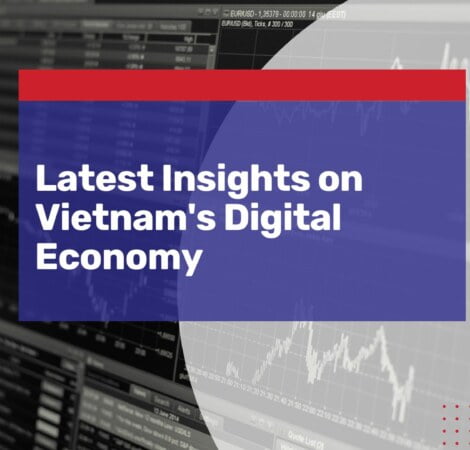A recent Google research indicated that the coronavirus pandemic had accelerated Vietnam’s digital economy. In fact, the digital economy in Vietnam expanded by 27.8% in 2022, amounting to US$ 23 billion. Research further estimated that the growth would continue until 2025 reaching nearly US$ 50 billion.
Prior to the COVID-19 episode, 3.1 hours per day was the time that Vietnamese users spent on the internet. This figure then increased significantly to 4.2 hours per day due to the nationwide lockdown.
Read More about Cekindo’s Business Registration Services for all types of foreign businesses.
The rapid growth of eCommerce and the adoption of e-Wallets is the main factor contributing to the burgeoning digital economic situation in Vietnam. In 2020, eCommerce expanded 63% year-on-year at US$ 62 billion. By 2025, this amount is expected to spike to approximately US$ 172 billion.
Latest Digital Market Trends
A report by Vietnam Report in July 2022 found five upcoming trends in Vietnam’s digital economy development, including global sensations such as 5G and blockchain.
- Cloud computing: The market for cloud-based services has the potential to grow 26% year-on-year as projections by the National Institute of Information and Communications Strategy say cloud-stored data will be used by half of all Viet citizens and all government entities by 2030.
- Artificial intelligence (AI): Two-thirds of businesses in Vietnam are already utilizing AI for administrative and customer service functions. The country also rose 14 ranks in Oxford Insights‘ AI readiness scale.
- Internet of Things (IoT): As data processes and cost optimization are crucial to a company’s bottom line, IoT penetration has been very rapid in Vietnam, with six in seven companies applying the technology.
- 5G & broadband: Internet use in Vietnam jumped 40% in 2021, resulting in more incentives and efforts in developing mobile and fixed broadband infrastructure across the country. In fact, 5G is one of the focuses of post-COVID recovery in Vietnam.
- Blockchain: MarketsandMarkets has predicted five-fold growth within five years for Vietnam’s blockchain sector. The tech enables secure information storage, especially for digital transactions.
Government Support to Accelerate the Digital Economy Transformation in Vietnam
Vietnam’s government issued various plans and guidelines in September 2020 to support the “Fourth Industrial Revolution” and the Conclusion of the 77 initiatives, agreed on. These initiatives have proven that the government is determined to transform its digital economy with proper legal frameworks.
Furthermore, the government established new policies to take in and pilot new and innovative technological solutions, conditionally. Vietnam’s technology sector is the crucial enabler for its digital infrastructure and its significant presence in the global market.
Through these policies and guidelines, relevant authorities will liaise with Vietnamese businesses to collaborate with renowned and sizable global technology corporations. The collaboration will include technologies and model transfer, establishment, and application.
Remaining Challenges in Key Areas in Vietnam’s Digital Economy
For the nation to ensure growth in the digital economy, challenges associated with critical areas in Vietnam’s digital economy need to be addressed.
The high-speed and useful internet is the foundation of a thriving digital economy. So the first and the most critical challenge for Vietnam’s digital economy transformation is to ensure that the majority of the population has reasonable access to 4G and 5G mobile networks. The country will also have to expand its broadband fiber optic networks for large institutions, schools, and businesses.
Related: Find out How to Establish a Presence with a Virtual Office in Ho Chi Minh City
The second obstacle that Vietnam’s government has to tackle is probably the high logistic prices. Vietnam’s logistics prices is one of the highest globally, contributing to 25% of GDP. Streamlined, efficient and cost-effective logistics service is one of the critical components of successful eCommerce and online trade.
Therefore, Vietnam still has substantial space to improve its logistics by providing more diverse and affordable logistics options such as last-mile delivery, low-value item delivery, and door-to-door services.
The third challenge concerns payments. The majority of the Vietnamese population still utilize cash for their daily transactions despite cashless digital payment development. In 2017, only 22% of Vietnam’s population made use of digital payments.
To encounter this issue, regulatory authorities and financial institutions shall work together to enable Vietnamese consumers’ digital-friendly payment environment. This collaboration must include customer protection, safe digital payments, and flexible digital payment systems.
Lastly, it is forecast that about 56% of five ASEAN countries’ workforce, including Vietnam, may face digital innovation replacement in 10 years. Hence, preparing the current workforce to be ready and skilled for this digital transformation is essential and compulsory.
About Us
InCorp Vietnam is a leading provider of global market entry services. We are part of InCorp group, a regional leader in corporate solutions, that encompasses 8 countries in Asia-Pacific, headquartered in Singapore. With over 1,100 legal experts serving over 15,000 Corporate Clients across the region, our expertise speaks for itself. We provide transparent legal consulting, setup, and advice based on local requirements to make your business perfectly fit into the market with healthy growth.
Don’t take our word for it. Read some reviews from some of our clients.
